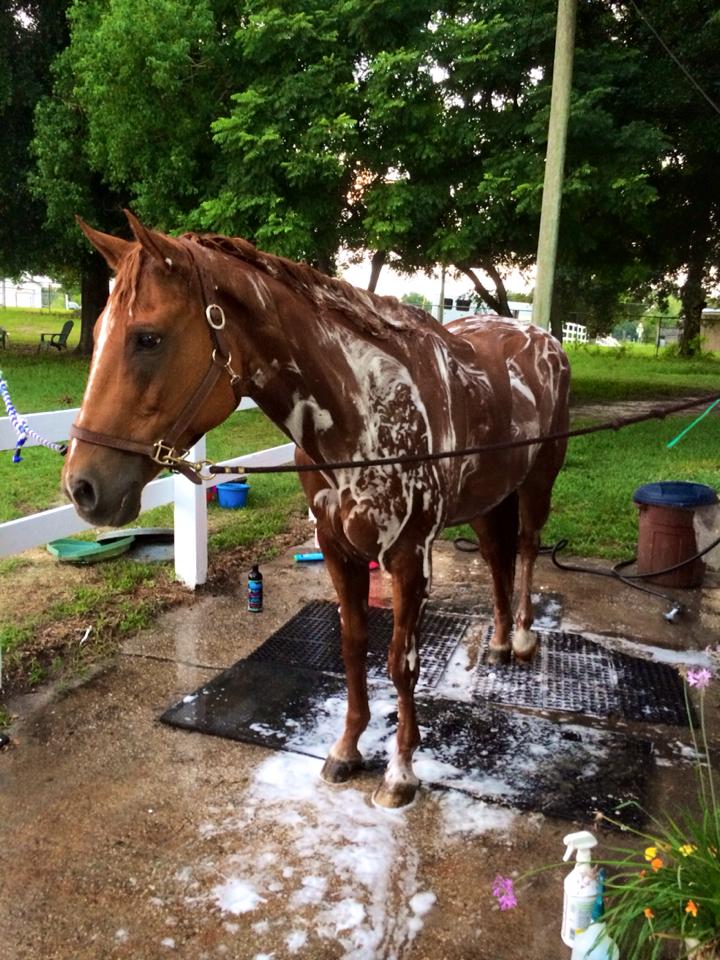Essential Horse Grooming & Care: Best Practices for a Healthy Horse
As someone who’s been in the saddle for over three decades, I’ve learned that proper grooming and care are not just about keeping our horses looking their best—they are crucial for their health and happiness. Here’s a deeper dive into the world of horse care through our Horse Grooming & Caring Guide, in which I blend years of hands-on experience with practical advice to help you keep your horse in peak condition.
Frequent Grooming: More Than Just Cleaning
Grooming your horse frequently is an essential part of horse care that does more than just clean your horse; it strengthens your bond and allows you to check for health issues such as cuts, swelling, or tender spots. I like to start with a curry comb to massage the skin—this not only helps in improving circulation but also helps in loosening dirt and dead skin. Next, a stiff brush removes this debris, while a soft brush adds a soothing finish, enhancing the coat’s natural oils for a beautiful shine. This routine not only keeps your horse clean but also provides a great opportunity to check for any skin problems or pests like ticks. Remember, a clean horse is a happy horse, and regular grooming will keep skin ailments and other health issues at bay. Plus, this regular routine helps reinforce trust and comfort between you and your horse, making it an invaluable practice for every horse owner.
Hoof Care: Foundation of Horse Health
Hooves are indeed the foundation of horse health, making regular hoof care a non-negotiable part of horse maintenance. It’s vital to pick your horse’s hooves daily to remove debris and check for signs of disease or injury, such as cracks or punctures. Regular appointments with a skilled farrier every six to eight weeks are crucial to maintain the hooves and ensure they are properly trimmed and, if your horse wears them, shod. Well-maintained hooves not only prevent a multitude of health issues but also support proper posture and body alignment, which can significantly affect overall horse health and performance in the ring or on the trail. Also, be vigilant about the signs of common hoof problems like thrush, which can quickly escalate from a minor issue to a major problem affecting the horse’s comfort and mobility.
Feeding and Hydration: Fuel for Performance
A well-balanced diet tailored to your horse’s individual needs is essential for its health, energy, and longevity. Horses are grazing animals by nature, so quality hay or pasture should make up the bulk of their diet, supplemented by grains and minerals as needed. It’s important to consult with a veterinarian or an equine nutritionist to customize your horse’s diet according to its weight, age, and the level of activity. Always ensure that fresh water is available at all times, as a horse can drink 5 to 10 gallons of water per day, and even more when active in warm weather. Monitoring and adjusting your horse’s diet and water intake are vital, especially as seasons and activity levels change. Adequate hydration is crucial to prevent colic, a common and sometimes deadly ailment in horses, making water just as important as food.
Dental Care: Often Overlooked but Vital
Many horse owners overlook dental care, yet it’s critical for the overall health of a horse. Horses need to have their teeth checked at least annually because uneven wear can lead to sharp points and edges that cause pain and difficulty chewing, which can affect nutrition and health. Regular floating (filing down the teeth) ensures that your horse can chew food efficiently and is comfortable while doing so. Signs that your horse may be experiencing dental issues include dropping food, weight loss, bad breath, or resistance to being bridled. A horse’s teeth can tell you a lot about its health, and regular checks help avoid the discomfort that can lead to more serious health issues or behavioral problems.
Rest and Shelter: Essential for Well-being
Providing your horse with a comfortable, safe place to rest is essential for its health. Adequate shelter protects horses from extreme temperatures, inclement weather, and pests, all of which can impact their health. Whether it’s a stable with good ventilation or a well-maintained pasture with a run-in shed, make sure your horse’s living quarters are clean, dry, and free from hazards. Regularly cleaning these areas reduces the risk of diseases and parasites, promoting a healthier environment for your horse. Additionally, horses need plenty of rest, especially after training sessions, so ensuring that their living conditions are comfortable is key to their recovery and well-being.
Regular Veterinary Care: Preventative is Key
Routine veterinary care is paramount in preventing diseases and maintaining your horse’s health. Regular check-ups, vaccinations, and deworming are all essential parts of a comprehensive horse care plan. These preventative measures help detect potential health issues early, making treatment more manageable and less costly. Establishing a good relationship with your veterinarian ensures that your horse receives the best possible care tailored to its specific needs. Remember, preventative care is not just about keeping diseases at bay; it also involves regular assessments of the horse’s overall well-being, which can include blood tests, physical exams, and sometimes behavioral assessments to ensure your horse is not only healthy but also happy.
Final Thoughts
Taking care of horses is a significant responsibility, but the rewards are immense. By adhering to these grooming and care fundamentals, you can ensure your horse remains healthy, happy, and active. Whether you’re a seasoned equestrian or a new horse owner, I hope these tips help you provide the best care for your equine friend. Let’s commit to giving our horses the high-quality life they deserve!

